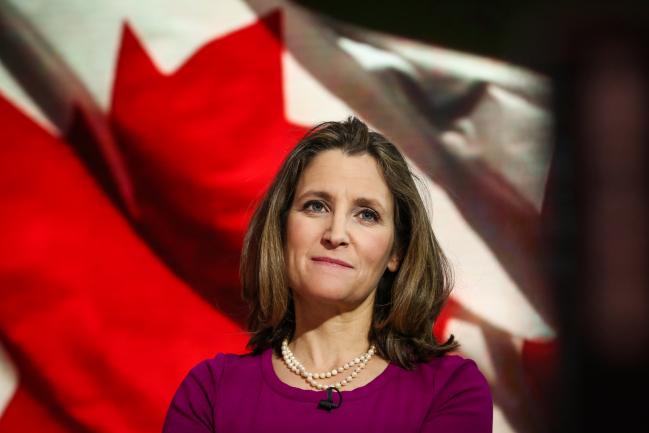(Bloomberg) -- High-level Nafta negotiations are set to resume in Washington as the U.S. and Canada push to reach a deal before the next deadline.
Canadian Foreign Minister Chrystia Freeland will arrive in the U.S. capital Tuesday and talks with U.S. Trade Representative Robert Lighthizer are due to resume Wednesday, according to four people familiar with the plans who spoke on condition of anonymity. The Canadian dollar climbed on the news, trading 0.4 percent higher at C$1.2990 per U.S. dollar at 9:39 a.m. Toronto time.
Only a few days likely remain until a handshake deal would need to be reached in order to generate text of an agreement by Sept. 30, which is the deadline to allow a new version of the North American Free Trade Agreement to be signed before Mexico’s incoming president takes office. Canada, however, has signaled it’s in no particular rush.
“Every time we get momentum, every time we work together, we do knock off a few more things and move closer to an eventual decision point. We’re not there yet,” Prime Minister Justin Trudeau said Monday in a televised interview with Maclean’s magazine. “There were points in the spring where we thought we were perhaps days or weeks away; turned out not to be the case. We might be days or weeks away now, it might not be.”
The U.S. is barreling down on the Nafta deadline as a trade fight with China escalates. The precise cutoff point for a handshake agreement is unclear, but a Canadian official believes it’s Thursday. Lower-level negotiators from both countries held talks last Thursday, Friday and again on Monday, Freeland told reporters in Ottawa. She said she and Lighthizer would meet this week but didn’t specify a day, saying it hadn’t been finalized.
“A lot of people are engaged in this effort and we’re talking a lot on the phone and by email but there are some conversations that it’s better to have face to face. I think it’s absolutely the right thing for us to meet this week,” Freeland said Monday.
The latest Nafta talks are aimed at keeping Canada in the trilateral deal, after the U.S. and Mexico struck their own deal last month on how to update the pact. U.S. President Donald Trump has threatened to proceed without Canada -- the top buyer of U.S. exports -- if a deal can’t be reached, and to hit the northern nation with auto tariffs.
The U.S.-Canada talks hinge on a handful of issues. The Canadians are essentially offering concessions on dairy and other issues in exchange for preserving certain parts of the pact, including anti-dumping dispute panels enshrined in Chapter 19 of the current deal, and an exemption for cultural sectors. The U.S. wants to eliminate the dispute panels.
